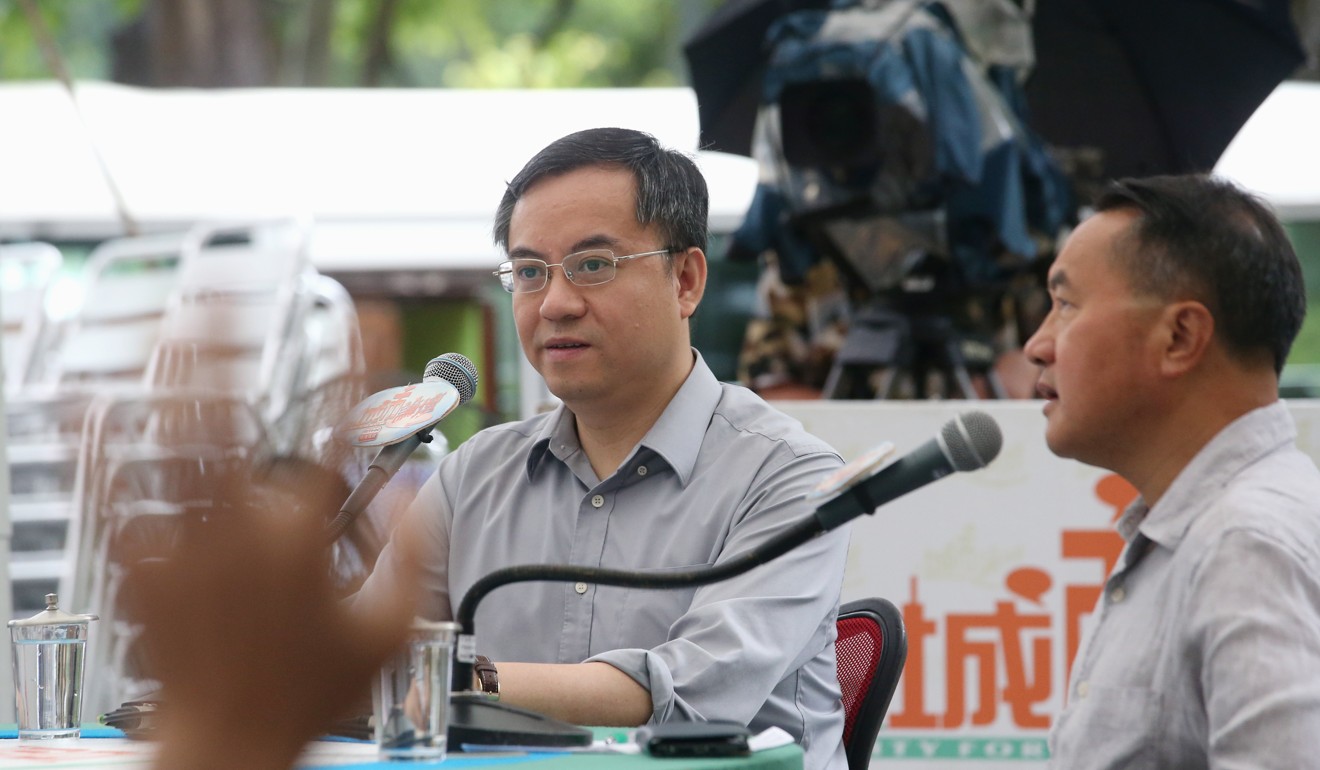
Paul Chan’s budget sounds alarm over need for Hong Kong to adapt to survive economic headwinds
- Financial Secretary Paul Chan warns that the city’s surplus will shrink significantly over the next five years
- Analysts agree that reform of Hong Kong’s economic structure is long overdue
The message was clear that Hong Kong would have to think hard about diversifying its economy and investing more in the future as Financial Secretary Paul Chan Mo-po warned on Wednesday that the city’s surplus would shrink significantly over the next five years.
Chan predicted in his annual budget speech that the surplus would plunge 54.7 per cent to HK$58.7 billion (US$7.48 billion) in the financial year ending on March 31, from a record HK$138 billion (US$17.6 billion) last year, as sagging property and stock markets took a toll on land premium income and stamp duties.
The main factors influencing Hong Kong’s positioning and future direction, Chan said, were the US-China trade war, changes in international cooperation, opportunities in emerging Asian economies, strategic opportunities offered by mainland China, and development of innovation and technology.
Analysts agreed that reform of the city’s economic structure was long overdue.

Billy Mak Sui-choi, associate professor of finance at Baptist University, said it would be worrying if the government continued to rely on land revenue and stamp duty as its major sources of income because both were tied to economic cycles and vulnerable to volatility.
“But the government is spending a lot of its budget on promoting economic growth, particularly the innovation and technology sector, nurturing talent from secondary school level,” he said. “This may help broaden the city’s revenue sources in future.”
The financial secretary said he would return the housing reserve – a fund set up to support the development of public housing – to the government’s fiscal reserves, as there would be no need to draw upon it in the foreseeable future.
The reserve, with a balance of HK$82.4 billion, was launched by Chan’s predecessor, John Tsang Chun-wah, in 2014, and will be returned over the four years to 2022-23.
Chan has also invited Fung Group chairman Victor Fung Kwok-king, former Chinese University vice-chancellor Professor Lawrence Lau Juen-yee, deputy chairman and chief executive for HSBC Asia Pacific Peter Wong Tung-shun and outgoing Monetary Authority chief Norman Chan Tak-lam to advise on the portfolio of the Future Fund, which the government set up in 2016 with a view to securing higher investment returns for its fiscal reserves.
Hong Kong’s gross domestic product would grow 2 to 3 per cent this year, compared with 3 per cent in 2018, Chan estimated.
Given our substantial fiscal reserves, we do not think there is a very urgent need for us to look for new income sources
And the surplus would gradually dry up to HK$8.13 billion in 2023-24 from HK$16.8 billion in 2019-20 and HK$58.7 billion for the year ending in March, as expenditure was expected to outgrow revenue, he said.
But asked if the government would consider exploring other sources of revenue, Chan did not think there was a pressing need to do so.
“If you look at profits tax and salaries tax, they have been growing in the last few years,” he said at a post-budget briefing on Wednesday. “At the moment, given our substantial fiscal reserves, we do not think there is a very urgent need for us to look for new income sources, although the tax policy unit should bear it in mind and keep this on the agenda for their work.”
Baptist University’s Mak noted that the dip in land revenue could be related to the government withdrawing sites earmarked for private development from its sales lists and reserving them for public housing instead.

“But you see the overall land revenue has not dropped significantly – because the private housing sites are sold at a higher price,” he said.
The sandwich class – those who earn too much to qualify for public housing but not enough to buy a home in the private market – might suffer, he added.
Chinese University economist Terence Chong Tai-leung said there would be a “structural change” in government revenue because income from land sales was likely to drop as more plots were reserved for public housing rather than private flats.
The sweeteners turn a bit sour: Chan dials down relief measures
He suggested raising other existing sources of revenue, such as the stamp duty rate for transfer of Hong Kong stocks, currently set at 0.1 per cent of the amount in consideration.
He also noted that profits tax had increased as more companies had set up offices in Hong Kong, after rates were cut under a two-tier system last year.

Chan forecast the city’s fiscal reserves would amount to HK$1.16 trillion by the end of the financial year on March 31, which represented 26 months of government expenditure. However, waning income from land premiums and continued spending would see that shrink to 19 months by the end of the 2023-24 financial year.
John Timpany, tax partner of KPMG China, said 19 months’ expenditure was “still a very large reserve” compared with other jurisdictions, and it was natural that land premium and stamp duty would fluctuate according to the economic cycle.
“I don’t think [the decline in the surplus] is alarming … as long as money is spent wisely,” he said.
Additional reporting by Gary Cheung and Tony Cheung


